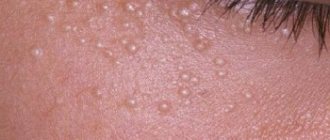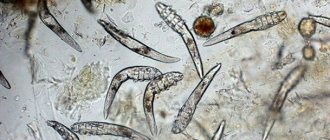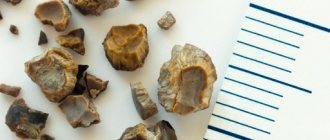When can pyelonephritis not be treated at home?
Primary inflammation of the kidneys can develop completely without a reason - “sitting on a cold stone”, but in most cases the cause of the infection is based on a violation of the correct flow of urine from the renal pelvis through the ureter into the bladder and beyond.
All patients with acute pyelonephritis are hospitalized to identify a process that interferes with the passage of urine. Outpatient treatment is provided only in cases of uncomplicated inflammation of the kidney, with absolute confidence that nothing prevents urine from flowing along the natural path.
Treatment in a hospital is absolutely indicated:
- with a single kidney or the presence of a second unhealthy one,
- clinical signs of purulent inflammation and septic reaction,
- with immunodeficiency and lack of response to antibiotic treatment.
Our expert in this field:
Dmitriev Sergey Viktorovich
Urologist, Ph.D.
Call the doctor
Treatment of kidney cysts with folk remedies
When a kidney cyst grows, it negatively affects the functioning of neighboring organs. How to treat a kidney cyst with folk remedies and how to remove it? The traditional method of treating kidney cysts includes the following components:
- burdock juice;
- Golden mustache;
- celandine decoction;
- crushed aspen bark.
Interesting! For kidney cysts in men and women, treatment with folk remedies should be accompanied by healing tea made from juniper, rose hips, hawthorn and barberry.
What medications are prescribed for acute pyelonephritis?
It is impossible to manage without antibiotics for kidney inflammation of any severity. The correct selection of medication is based on identifying the causative agent of infection in the urine and determining its resistance and sensitivity to antibiotics. In most cases, initial therapy is started without test results - empirically. When the laboratory prepares an answer, the drug treatment will be adjusted.
Chronic pyelonephritis regularly “supplies” patients for dialysis and kidney transplantation. Today, the possibilities of therapy are so significant that if it is impossible to avoid an acute infection, the chronic form should not develop at all. People suffer from pyelonephritis not so much because of limited medical care, but because of the inability to carry treatment to its logical conclusion.
Treatment with folk remedies for polycystic kidney disease
One of the most common pathologies is polycystic kidney disease. Treatment with folk remedies with the best reviews will help get rid of this problem. Experts recommend consuming echinacea, mullein, burdock leaves, aloe leaves, and thistle.
If you are worried about your kidneys, in the PhytoContinent store you will find the best traditional medicine recipes that will help you cope with the disease. The raw materials are harvested in ecologically clean areas of the country and have a healing effect, confirmed by numerous reviews from our customers.
Buy rose hips (fruits) on our website
Review
Pyanzova Larisa, 52 years old, Mozhaisk
I’ve been as healthy as a bull all my life, I’ve never even been in the hospital!
And then suddenly this summer my legs began to get very tired and swollen, I didn’t pay attention, I thought I needed more rest from the garden! But then my back began to hurt and it was clear that there was a problem with my kidneys. Well, the doctors didn’t really advise anything, they prescribed a lot of medicine, I’ve never spent so much on pills in my entire life! But even for a whole month I drank them, but there was no result, only my stomach got sick! Our sister-in-law works as a nurse, and instead of taking pills, she recommended drinking three decoctions of rose hips, bay leaves and celandine to cleanse the kidneys. I drink them in turn every day. I also bought parsley root, yarrow and drank tea with thyme every day, which the pharmacy recommended to relieve inflammation. In general, a couple of weeks on these teas and my feet can fit into all my shoes again, they don’t swell so much, and my back also stopped hurting, I was told that if it’s inflamed, the main thing is not to warm it up, so mustard plasters are not allowed, and I also put off going to the bathhouse for now .
Diagnosis of kidney inflammation by urine analysis
The first way to confirm a clinical suspicion of infection is to do a urinalysis. There will be a lot of leukocytes in the urine, mainly neutrophilic and stab, accompanying any inflammation. It is possible that there is protein and some red blood cells, alkaline pH. In general, the inflammatory reaction of urine, when combined with characteristic symptoms of the disease, is quite capable of confirming the diagnosis; however, these completely nonspecific changes can occur in many diseases.
With pyelonephritis, there should be bacteria in the urinary sediment - more than 10 thousand per milliliter. A bacteriological microflora analysis will allow you to identify the pathogen and select targeted antibacterial therapy.
In case of acute infection, before results are obtained, treatment with broad-spectrum drugs that suppress the most common infectious agents should already be carried out. When bacteriological results are obtained, therapy will be adjusted.
In a chronic process, treatment should begin only after identifying the specific culprit of the problem, which allows you to get the best result.
Hypertension drugs
Blood pressure medications for kidney disease also have a number of contraindications. The most gentle include angiotensin-converting enzyme inhibitors: fonisopril, enalapril, captopril. They increase glomerular filtration, sometimes increasing creatinine and potassium. Possible risks are observed in elderly patients, so treatment should be carried out under medical supervision. Reception is contraindicated:
- with stenosis of the renal arteries (both or only);
- heart failure;
- severe renal failure in combination with diuretic therapy.
The group of calcium channel blockers is no less effective; diuretics are also actively used.
When taking medications for kidney pressure, the amount of potassium in the blood serum should be monitored. Its increase is provoked by a deficiency of renal function. The likelihood of hyperkalemia increases when taking drugs from different groups simultaneously. Therapy is started with small doses, and when increasing, a control test is prescribed.
Diagnosis of pyelonephritis by blood test
Diagnosis of kidney inflammation using a general blood test tends to zero in terms of specificity. There will be a lot of leukocytes, with a predominant proportion of neutrophilic forms, especially stab ones, accelerating the erythrocyte sedimentation reaction (ESR). This is a typical blood condition in any infection, proof that there is an inflammatory process in the body, but this is not enough to make a diagnosis of pyelonephritis.
Biochemical analysis will show the functionality of the paired organ only if the disturbances are significant.
Take care of yourself, book a consultation now
What is kidney inflammation - symptoms and treatment
Kidney inflammation is a common disease that patients in most cases endure on their feet and treat it as a common ailment. Such carelessness most often turns into a serious diagnosis, which not only significantly worsens the quality of life, but is also very expensive to treat.
Every medical services center (Rostov-on-Don) knows many stories when lost time and improper treatment led the patient to a difficult situation where he grasps at any opportunity just to get better.
The kidneys are the most important organs in the filtration and cleansing system of our body. So important that nature duplicated them. You know very well that humans do not have many paired organs.
The most important thing to keep them healthy is prevention. A healthy lifestyle and proper physical activity charge your body with youth and health, then you will not need any paid medical services center.
What to do if suspicious symptoms appear:
- Pain in the lower back; in women, pain in the lower abdomen is often added;
- An increase in body temperature from slight indicators (from 37 degrees) to 39 degrees;
- Fatigue and loss of strength;
- Uncontrollable small portions of urine are also possible;
- Changes in urine characteristics - cloudiness or darkening.
It is quite obvious that such symptoms can occur in many other diseases, for example, gynecological symptoms are similar. And this is a common misconception about the ability to make a correct diagnosis.
Another important point is that the inflammatory process itself can be associated with a number of reasons. These include various bacteria, a violation of the trophism (nutrition) of the kidney due to deformations, and prolapse, displacement of the organ itself.
Naturally, each case will have a completely different treatment.
In most cases, patients believe that their inflammatory process is associated with hypothermia and the development of bacteria. To relieve inflammation, buy broad-spectrum antibiotics and begin self-medication. This can have an effect in some situations, but also, most experiments end in a trip to the doctor, damaged by one’s own microflora and already difficult to diagnose due to indicators blurred by drugs.
Even worse is the independent prescription of diuretic folk remedies, which increase the load on an already inflamed organ. As a result, severe exacerbation with a rise in temperature to 39 is common in this situation.
Therefore, before deciding how to relieve kidney inflammation, it makes sense to conduct a full diagnosis, which is offered by medical centers in Rostov-on-Don, and tests.
If you still think that you really have an inflammatory process of the kidneys, then do at least an ultrasound examination, even based on the result of one and a conversation with a diagnostician, you will be able to understand the right path for selecting therapy.
Where to have an ultrasound (Rostov-on-Don) is decided by everyone independently, but we recommend choosing medical centers with expert-class equipment that most accurately determines the condition of the organs.
While the process has not been treated, it is possible to identify what caused the kidney inflammation, symptoms, and treatment is already prescribed exactly in accordance with the situation of this particular patient.
Heratsi Medical Center offers to start treatment of kidney inflammation on the most favorable terms.
- You can get a free appointment with a therapist who will write out all the necessary directions for tests and diagnostics, so that you can come to the urologist prepared for a quick diagnosis and treatment;
- Undergo an ultrasound scan using expert-class equipment without extra charges and receive explanations in human language on how to decipher the diagnosis;
- Take tests in our center and receive the results by email (a very convenient format, not only to reduce the time it takes to get the results, but also for safety);
- Get advice from a specialist, with the opportunity to choose a doctor;
- In the treatment room, you can give injections for kidney inflammation, both intramuscularly and intravenously;
- Our medical center openly publishes: prices, services, reviews and doctor pages;
- Online appointment with any doctor at a time convenient for you.
Take advantage of preferential offers - make an appointment with a urologist at your convenience.
Instrumental diagnosis of pyelonephritis
Diagnostic ultrasound is more specific, but only in combination with clinical symptoms and bacteria in the urine. Ultrasound reveals swelling of the kidney tissue and even purulent lesions in it. Additional Doppler ultrasound will indicate changes in renal blood flow. If the calyces and pelvis are dilated, then it can be assumed that there is an obstruction to the normal outflow of urine, which has become a risk factor for pyelonephritis.
In case of chronic inflammation of the kidneys, an ultrasound will reveal a change in the size of the organ and the replacement of normal tissue with scar tissue - nephrosclerosis.
This is a standard and mandatory diagnosis for pyelonephritis; then the examination program is selected for each patient individually.
What will the surveys tell us?
Next, the search begins for the root cause of the disease, which interferes with the normal outflow of urine pathology.
A long-standing method that has been seriously modernized by innovations - survey urography will find stones. The use of a contrast agent secreted by the kidneys in radiography - excretory urography will reveal specific signs of inflammation of the kidney and the level of blockage of the outflow of urine.
Visual diagnostics - CT and MRI are also aimed at finding the main cause that contributed to the development of inflammation: abnormalities in the urinary tract, tumor or urolithiasis. Such a diagnosis is necessary in the absence of a positive response to 3 days of treatment and ongoing fever. The release of radioactive isotopes by the kidneys makes it possible to assess their function and the symmetry of damage.
In some cases, a kidney biopsy will be required to make a differential diagnosis in doubtful cases when all previous studies have not given a clear answer.
What consultations are needed for kidney inflammation?
At the Medicine clinic, 24/7 patients with pyelonephritis are observed by a urologist - a universal specialist, a diagnostician, clinician and surgeon in one person. In most public health institutions, staffing shortages relegate him to the role of consultant.
Competent opinion of a nephrologist may be required, especially if there is concomitant immunodeficiency or evidence of renal failure. A patient with pyelonephritis on the background of diabetes mellitus should be monitored by an endocrinologist in parallel.
At the Medicine 24/7 clinic, all patients receive assistance from all the necessary specialists according to the standard with adjustments according to an individual program. Contact the Urology Center for help by phone: +7 (495) 230-00-01
At the very beginning, acute pyelonephritis, which develops in the absence of disturbances in the outflow of urine - primary is often mistaken for another inflammatory disease: ARVI, exacerbation of chronic cholecystitis and even appendicitis or infection, because there is no main symptom - signs of inflammation have not appeared in the urine.
What symptoms are characteristic of acute pyelonephritis?
Inflammation of the kidney is characterized by a combination of three symptoms, namely a combination, and not the presence of one or two of the three. Their severity depends on many reasons: the prevalence of inflammation inside the kidney, the state of immune defense, and the individual sensitivity of the patient.
Classic triad of symptoms:
- Pain in the lower back, tapping on it responds to an increase in the intensity of the pain.
- High temperature is a fever, often very severe.
- Pathological changes in urine: a large number of leukocytes and bacterial flora.
If the cause of an ascending urinary tract infection is cystitis, the most common cause of illness in women, then frequent and painful urination – dysuria – is possible. Inflammatory products can cause intoxication in the form of headaches, weakness, nausea, thirst, but these are nonspecific symptoms, that is, they can occur in many diseases.
Despite its apparent simplicity, the diagnostic stage is one of the most difficult; modern equipment and our own professional experience make it easier for the specialists of the Medicine 24/7 clinic to make the correct diagnosis.
Enduring pain is life-threatening!
Take care of yourself, schedule a consultation today
How does acute kidney inflammation develop?
The infection, having got inside the kidney tissue, first forms inflammation of the tubules and interstitial tissue, gradually and unevenly distributed to the vessels and glomeruli. In each case, the inflammation resolves individually, but the patient tolerates damage to the pelvis more easily than the organ tissue itself. After an infection, damage does not recover; scars form at the site and the kidney shrinks.
Symptoms of pyelonephritis in men and women
The structural features of the urinary system affect the course of pyelonephritis. Since women have a shorter urethra, it is easier for infection to reach the kidneys; pyelonephritis is often a consequence of untreated cystitis. Women more often suffer from kidney inflammation; the symptoms of pyelonephritis are more pronounced in them:
- rise in body temperature above 38 °C;
- characteristic features of general intoxication;
- change in the color of urine - up to a dirty yellow or darker color, and in case of urolithiasis and renal colic, there may be blood impurities in it.
Symptoms of pyelonephritis in men are often more subtle:
- thirst and dry mouth;
- general malaise;
- pain in the lumbar region.
What stages does acute pyelonephritis go through?
The infection goes through two stages of the process: serous and purulent inflammation. The serous undergoes reverse development, but in some cases it passes into the purulent stage; it develops in every fourth patient in several forms: apostematous pyelonephritis, carbuncle and abscess.
During this period, the kidney is inflamed and swollen, the renal capsule stretches and this gives a feeling of pain. The fiber around the organ also swells, aggravating the pain syndrome. Fever is caused by the release into the blood of bacterial toxins, biologically active substances secreted by immune cells, and products of cellular decay. In case of a disease that arises from disturbances in the outflow of urine, all clinical manifestations are more pronounced.
Antibiotics
Even with minor renal failure, drugs in this group should be prescribed by a doctor. Patients with nephrology should avoid sulfonamides, aminoglycosides, ciprofloxacin, amphotericin. The drugs disrupt normal filtration and cause an increase in urea and creatinine levels in the blood. When selecting therapy, possible risks and potential benefits should be weighed. It is imperative to notify your doctor about renal pathology, since there are a number of effective analogues without toxic effects.
When prescribing tablets, the glomerular filtration rate should be monitored in order to adjust the regimen and dose of the antibiotic.
Symptoms of carbuncle and kidney abscess
In every third person, apostematous pyelonephritis is complicated by the formation of a large abscess - a carbuncle. There can be several carbuncles, usually with a diameter of no more than 2 cm. The abscess can open into the surrounding tissue and pus forms around the kidney.
With a kidney abscess, tissue necrosis first appears, for example, as a result of a blood clot from bacteria and blood clots blocking the vessels, then pus forms, but this variant of the disease is very rare.
With purulent melting, the temperature rises over 40°, the urine is almost purulent, the condition is extremely serious with a change in consciousness. Severe pain in the lumbar region when an abscess ruptures changes in character, the condition improves somewhat for a short time, then progressively deteriorates.
From the very beginning of the development of the disease, you should trust your health to doctors, and then the likelihood of developing purulent melting is negligible. Our doctors are able to quickly diagnose and treat correctly, contact the Urology Center for help by phone
We will call you back
Leave your phone number
Both kidneys can become inflamed at once or one by one, so pyelonephritis can be bilateral or unilateral, then it is called according to the side of the lesion, for example, right-sided.
A single infection - acute pyelonephritis; if the disease occurs in waves with exacerbations and periods without illness, then it is a chronic process. Chronic pyelonephritis affects mainly women, which is due to a higher incidence of cystitis and impaired passage of urine through the ureters during pregnancy.
The Medicine 24/7 clinic not only has excellent diagnostic equipment, but also specialists who are able to establish a diagnosis when the signs of the disease are not obvious and the interpretation of the examination results is unclear. Contact the Center for Urology and Andrology by phone: +7 (495) 230-00-01.
What causes contribute to pyelonephritis?
The disease, which occurs in the absence of an anatomical obstacle to the evacuation of urine, is considered primary acute pyelonephritis, which arose almost without reason against the background of hypothermia.
Accordingly, the cause of secondary inflammation of the kidneys is a disease that creates an obstacle to the outflow of urine. The list of causes is headed by anatomical abnormalities of the ureters, their narrowing after injury or blockage by a stone. Cystitis, reflux of urine from the bladder, as well as stagnation of urine in the bladder due to diseases of the prostate gland, tumor or neurological disorders of urination contribute to the development of an ascending infection.
Symptoms of chronic pyelonephritis
The chronic course is characterized by alternating acute phases and stages of remission. The active period will be characterized by the symptoms of acute pyelonephritis described above. And in the remission stage, a person may feel the following symptoms of chronic pyelonephritis:
- dull pain in the lower back;
- fatigue and lethargy;
- temperature rise to subfebrile levels;
- loss of appetite, nausea.
Without treatment, chronic renal failure occurs; a secondary wrinkled kidney becomes an ultrasound sign of chronic pyelonephritis. Another symptom of late-stage disease is high blood pressure.
Risk factors leading to kidney inflammation
If there is an obstruction to the normal flow of urine, there are factors that increase the likelihood of developing a urinary tract infection. The reasons are almost the same as those that help initiate acute cystitis:
- Sexually transmitted infections and the costs of sexual behavior;
- Age-related decrease in hormone production, dyshormonal disorders and the use of hormonal drugs, most often contraceptives;
- Immune capabilities linked to blood group, which are referred to as “secretory type”;
- A complication of diabetes mellitus is damage to small vessels or microangiopathy.
What urological causes can lead to pyelonephritis?
For every five women with kidney inflammation, there is only one man; in him, the most common cause of the disease is typical urological problems:
- Condition after urological surgery in general, when immunity decreases, and installation of a catheter in the bladder in particular;
- Neurogenic bladder, the treatment of which is not yet so effective;
- Blockage of urine outflow through the ureter by a stone or narrowing after injury.
Take care of yourself, book a consultation now
Kidney cleansing with folk remedies
Before cleaning your kidneys at home using folk remedies, make sure there are no contraindications. Although cleaning the kidneys at home using folk remedies will not cause any particular difficulties, we recommend:
- Drink carrot, beet, and celery juice.
- There is watermelon with rye bread.
- Take rosehip decoction.
- Drink bay leaf decoction regularly.
What does a severe course of the disease promise?
The effectiveness of pyelonephritis therapy is not always determined only by the sensitivity of microorganisms to drugs and the correctness of treatment measures; there is a group of causal factors that worsen therapeutic prospects:
- Pregnancy, firstly, the growing uterus interferes with the passage of urine; secondly, there are significant restrictions on the use of medicines; thirdly, the notorious hormonal changes.
- In men, pyelonephritis is worse because it occurs in old age against the background of irreparable urological problems and concomitant diseases.
- Immune disorders, especially HIV, help develop infections with an atypical pathogen, which is fundamentally not pathogenic.
- Out-of-control diabetes mellitus and autoimmune diseases affecting connective tissue. In principle, any chronic disease worsens the prognosis of kidney infection.
Symptoms of pyelonephritis in pregnant women
During pregnancy, a woman's kidneys experience maximum stress. The growing uterus puts pressure on the urinary system, the sepal system and ureteral canals expand. All this leads to the fact that pregnant women have an increased risk of pyelonephritis. Symptoms of pyelonephritis in pregnant women are similar to those observed in the acute form of the disease:
- signs of intoxication;
- lower back pain;
- change in urine color;
- fever.
Possible prevention of kidney inflammation
Since no one is guaranteed against acute infection, one should be guided by the principle of “God saves the best”:
- It is important not to overcool, treat acute infections of the throat and nose and various bacterial processes.
- Treat purulent processes, since it is possible that pathogens can be carried into the renal parenchyma by blood and lymph.
- Don't let diabetes mellitus take its course; it can cause deadly troubles.
- It would be good to avoid pathological obstacles to the normal flow of urine. If this does happen, then it is necessary to carry out treatment as quickly as possible and restore the passage.
Specialists from the Urology Center of the Medicine 24/7 clinic can help with this, they know all the modern treatment methods recommended by leading foreign centers.
What antibiotics can be prescribed without analysis?
In most cases, the causative agent of infection in an ordinary person who does not live in a dormitory or boarding school is E. coli. Therefore, at the first stage, 3rd generation cephalosporins may be prescribed, to which the microorganism has no resistance. One drug may be sufficient; if the patient is intolerant to cephalosporins, reserve drugs are recommended.
In patients weakened by concomitant diabetes, the cause of acute pyelonephritis is often staphylococcus, sensitive to ciprofloxacin and other drugs. In all cases, toxic drugs with a selective effect on the kidneys - nephrotoxic drugs, which are predominantly excreted by the liver - are not used. Additionally, intravenous solutions are prescribed to improve metabolic processes in the kidneys and replenish fluid deficiency.
We will call you back
Leave your phone number
Surgery for acute pyelonephritis
In case of primary pyelonephritis, which developed during normal passage of urine, surgery is performed for a purulent process: carbuncle, abscess and apostematous nephritis.
In most cases, surgery is resorted to when there is a violation of urine excretion from the kidney, which is possible when the ureter is blocked by a stone or narrowed along its length. When narrowing, minimally invasive intervention is successfully used - catheterization with stent installation under X-ray control. They also try to remove the stone endoscopically; in some cases, a nephrostomy is installed, through which urine is removed to the outside, bypassing the ureter.
Correct drinking regime
To wash sand out of the kidneys, you need a high-liquid drinking regimen. During the day, you must drink at least 1.7-3.0 liters of pure non-carbonated water (not tea, coffee, juice, etc.), preferably warm, regularly between meals. You can drink alkaline mineral water, which prevents the formation of salts. Essentuki, Narzan, Borjomi are suitable. By increasing the volume of daily urine and decreasing its concentration, good conditions are created for removing existing sand and preventing its formation in the future.
Is the prognosis always favorable?
In most patients, acute pyelonephritis results in complete recovery. In some cases it becomes chronic, alternating between activity and “sleep” of the infection. Due to concomitant severe chronic diseases and the resulting immune deficiency, infectious-toxic shock may develop; every fifth patient dies from it.
Purulent inflammation of the kidney leads to scar tissue changes and, naturally, a decrease in functionality; with a healthy second kidney, all this is more than compensated for and the person lives a normal life. Even without one kidney, you can feel quite normal and live a long and quality life.
At the Medicine 24/7 clinic, an individual approach is applied to each patient based on the clinical recommendations of the world's leading medical doctors, so our patients are focused on optimal results and a speedy recovery. Contact a specialist at the Urology Center for help by phone











